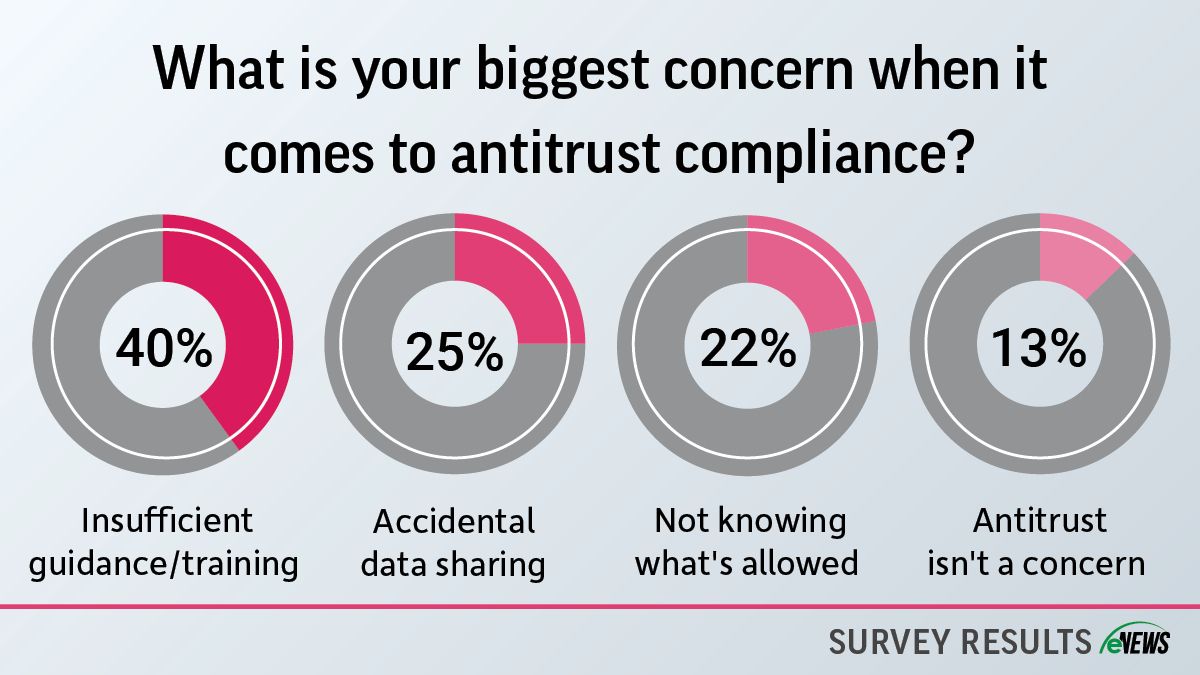Business Practices, eNews
Understanding antitrust: A guide for credit managers

As a new credit manager, understanding antitrust laws is key for safeguarding your company’s interests and ensuring compliance.
Why it matters: These laws are designed to promote fair competition and prevent practices that can harm other businesses.
Information shared during industry credit group meetings and in daily conversations cannot restrain trade and must be impartial, historical, factual and unemotional because of antitrust laws.
Antitrust laws include:
- Robinson-Patman Act: which protects businesses from being driven out of the marketplace by prohibiting discrimination in pricing of the sale of commodities, promotional allowances and advertising.
- Sherman Antitrust Act: which prohibits activities that restrict interstate commerce and competition in the marketplace.
- Clayton Act: which promotes fair competition and prevents unfair business practices that could harm consumers.
- Federal Trade Commission Act: which prohibits unfair methods of competition and deceptive acts and practices.
Antitrust law violations can result in penalties, fines, imprisonment and other bad outcomes. The Department of Justice (DOJ) leniency (or amnesty) program increases the likelihood that violators will be prosecuted.
The don’ts of antitrust:
- Don’t exchange price information (including credit terms) or payment terms.
- Don’t agree on credit terms.
- Don’t discuss forward-looking credit terms or future actions.
- Don’t share opinions or rumors about customers.
- Don’t boycott or ostracize customers or suppliers.
- Don’t divide markets or allocate customers.
- Don’t discuss information learned at credit group meetings after the conclusion of those meetings, and don’t continue discussions about matters raised at such meetings or other business matters with competitors, whether in side-conversations at credit group meetings or in social settings.
- Don’t share information from credit groups with anyone at your company not involved in the credit function and who does not need to know such information.
Exchanging credit information is allowed if it helps members make independent credit decisions. This can lead to fewer uncollectible debts, lower costs and lower prices for consumers, all of which antitrust law generally would support.
Even the most minor expressions of opinion can lead to complications. “You should not give an opinion or speculate which can cause your competitor or other members of your group to be influenced by your opinions on a specific customer,” said Deana Reynolds, director of credit at Edges Electrical Group (Sacramento, CA).
Tips to mitigate risk:
#1 Speak up
If anything said during those meetings is objectionable or problematic, you must speak up. For example, if someone mentions a client is over 30 days late on payments and suggests limiting their terms due to XYZ, immediately object and leave the discussion.
- “The safest course of action an individual can take is to make it clear that they had nothing to do with the objectionable conversation,” said Sydney Kaplan, Antitrust/Competition associate at Lowenstein Sandler LLP (Washington, D.C.).
#2 Document everything
Documenting every discussion, topic and customer mentioned in industry credit groups will help you avoid antitrust violations, especially any problematic discussions. “Make sure that your noisy exit from any improper discussions is recorded in the meeting minutes, keep your own internal records about the incident and speak with your internal counsel immediately after the problematic meeting,” Kaplan said.
#3 Seek legal counsel
It is critical to consult with legal counsel in antitrust scenarios. Suppliers need to legally be able to support the price or credit terms they offer to their customers. “Creditors are prohibited from sharing terms or prices and from discussing and making decisions about shared customer strategy,” said JoAnn Malz, CCE, ICCE, NACM Chair and director of credit, collections and billing at The Imagine Group LLC (Shakopee, MN).
- “For trade reference requests that ask us to supply payment terms, I try to always note on the return response that antitrust prohibits us from asking and supplying data associated with customer payment terms. I do not respond with payment terms,” Malz said.
#4 Meeting Competition Defense
To counter Robinson-Patman Act claims, credit professionals can use the ‘meeting competition defense.’ This legal defense is used in antitrust cases where the defendant argues that they lowered their prices in good faith to match a competitor’s equally low offer. “Under the defense, the credit professional can meet the price that the competitor had offered without being accused of discriminatory pricing,” Kaplan said. “But the key is that they can only meet that price. They can’t beat it.”
Yes, but: Credit professionals must confirm the legitimacy of received information by requesting proof from the customer that the customer received those terms from a competitor, unless they have a good faith belief in the customer’s trustworthiness. Or you can ask for documentation that they received these terms from the competitor, but don’t ask competitors to confirm the accuracy of the information provided by the customer.
#5 Plan ahead
Prior to the meeting, send out an agenda or handout for members to review and discuss with their internal counsel prior to the meeting. This prepares them for any topics at risk of antitrust violations.
Regardless of the extent of your planning, it is prudent to anticipate and prepare for the worst-case scenarios. “Trade creditors must ensure they’re in compliance when asked direct questions because not everybody in your credit group understands antitrust and they could ask you questions that are going to get you in trouble,” Reynolds said.
The bottom line: Industry credit groups can aid in informed credit decisions. Professionals must adhere to antitrust laws and practices.





